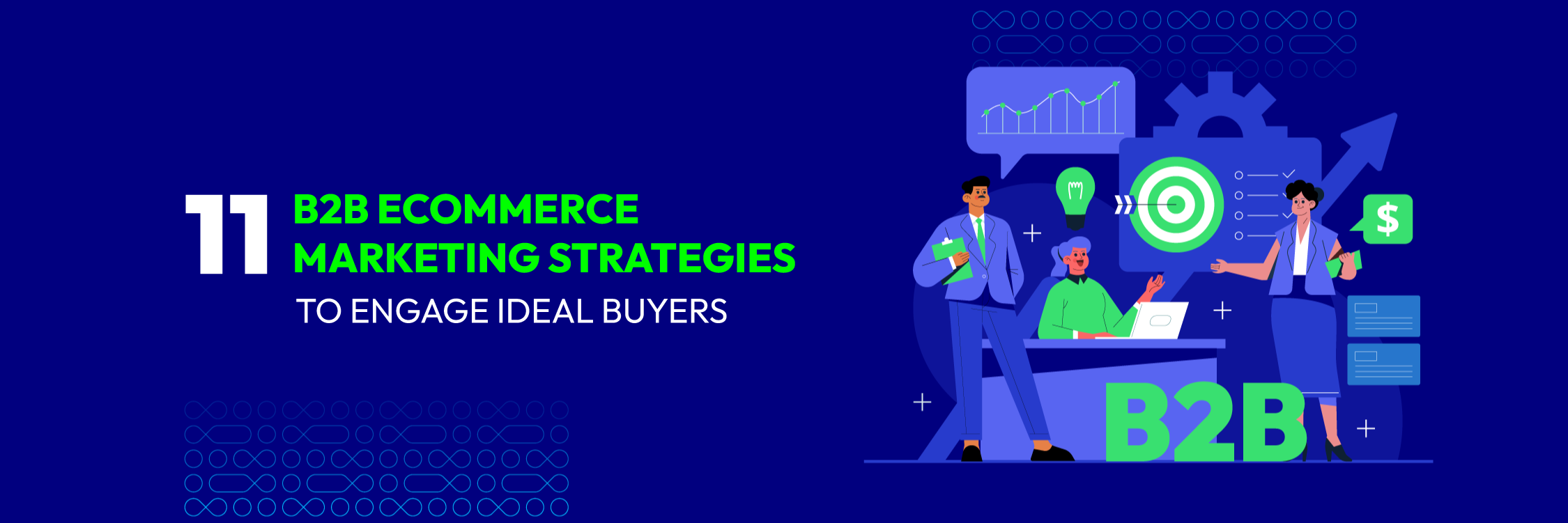Hyvä Theme is Now Open Source: What This Means for Magento Community - Mageplaza
Hyvä is now Open Source and free. Discover what changed, what remains commercial, how it impacts the Magento ecosystem, and how to maximize its full potential.

Navigate the realm of B2B eCommerce with finesse as we unveil 11 powerful marketing strategies tailored to captivate your ideal buyers. By focusing on several key areas, embark on a journey of strategic mastery and elevate your engagement game.
This article serves as your guide, unveiling 11 potent B2B eCommerce marketing strategies thoughtfully organized into three categories: Search Engine Optimization (SEO), Pay-Per-Click Advertising (PPC), and Conversion Rate Optimization (CRO).
Whether you’re seeking to enhance your website’s visibility, amplify your online advertising efforts, or optimize the conversion journey, these 11 strategies span the spectrum of B2B eCommerce marketing, providing a comprehensive roadmap to navigate the challenges and seize the opportunities that lie ahead.

One of the most common B2B eCommerce marketing strategies for SEO is to understand your target audience. Buyer personas serve as composite representations of your ideal customers, allowing you to tailor your content to address their specific needs and challenges. By expanding your strategic content around these buyer personas, you can establish a more robust online presence and engage potential clients on a deeper level.
To effectively implement this strategy, the first step is thorough research and definition of your buyer personas. Gather demographic information, identify pain points, challenges, and preferences. This data forms the foundation for crafting content that resonates with each persona. Content types such as blog posts, whitepapers, and case studies can be vehicles for addressing their concerns and positioning your products or services as the solutions they seek.
Furthermore, keyword optimization is crucial. Incorporate relevant keywords within your content to enhance its visibility on search engine results pages (SERPs). Informed by keyword research, ensure that your content aligns with the terms your target audience is likely to use when seeking products or services akin to yours.
While a substantial content library can be advantageous, quality always takes precedence over quantity. Thin or irrelevant content can dilute your website’s authority and hinder your SEO progress. Pruning thin content involves identifying and addressing low-quality pages, which helps search engine crawlers focus on your strategic, high-value content.
Begin with a comprehensive content audit. Evaluate pages with low traffic, high bounce rates, and limited engagement. These pages are potential candidates for improvement or removal. For pages with similar or redundant content, consider consolidating them into comprehensive pieces. For existing pages, enhancing the content with updated information and additional insights can significantly improve its value.
When removing pages, deploy 301 redirects to guide users and search engines to relevant, high-quality content. This practice preserves any SEO value and prevents the occurrence of broken links, which can harm user experience and SEO rankings.

User experience is a cornerstone of SEO success. A well-designed, fast-loading website that functions seamlessly on various devices not only pleases visitors but also garners favor from search engines. Optimizing your website’s design and speed is an integral part of your B2B eCommerce SEO strategy.
Ensure your website is mobile-friendly and responsive, providing a seamless experience across smartphones, tablets, and desktops. Google prioritizes mobile-friendly websites in its rankings, making this optimization essential.
To accelerate page loading times, compress images, minify code, and leverage browser caching. Slow-loading pages can lead to higher bounce rates and lower search engine rankings.
Intuitive navigation is key. Simplify your website’s structure to facilitate swift and straightforward access to information. Users should effortlessly find the content they seek, contributing to a positive user experience.
Implement structured data markup to offer search engines additional context about your products, services, and content. This can result in rich snippets in search results, heightening your content’s visibility.
In the intricate world of PPC advertising, harnessing negative keywords and employing tiered campaigns can be game-changers for your B2B eCommerce marketing strategy.
Imagine you operate a B2B software company specializing in project management solutions. To ensure your ads appear only to relevant prospects, it’s crucial to identify and exclude keywords that may trigger your ads for unrelated searches. For instance, excluding terms like “free project management software” can help you avoid clicks from users seeking complimentary solutions, which may not align with your premium offerings.
Tiered campaigns involve segmenting your products or services into distinct categories based on performance. For instance, if your B2B eCommerce store offers a range of industrial equipment, you can create separate campaigns for “Heavy Machinery,” “Safety Gear,” and “Maintenance Tools.” This allows you to allocate budget and bidding strategies more effectively, ensuring that high-performing products receive the attention they deserve.
Branding is paramount in B2B eCommerce, and optimizing branded search campaigns can amplify your brand’s visibility and authority.
Imagine a potential customer is already familiar with your brand, searching specifically for your B2B solutions. Crafting branded ads with targeted messaging can drive home your unique value proposition, leading to higher click-through rates and conversions. Moreover, it safeguards against competitors bidding on your brand keywords, ensuring that your brand retains its rightful place at the top of search engine results pages (SERPs).
Branded search campaigns also provide an opportunity to showcase your brand’s authority and credibility. Displaying reviews, testimonials, and awards can reassure potential customers and establish your B2B eCommerce business as a trusted industry leader.
Related topics:

Securing more real estate on SERPs is a fundamental principle of successful PPC advertising. By utilizing multiple ad copies and strategic ad extensions, you can capture the attention of potential B2B buyers and drive higher engagement.
Crafting multiple ad copies with diverse messaging enables you to test different approaches and identify what resonates most effectively with your target audience. For instance, an ad highlighting “Cost-Effective B2B Solutions” may appeal to price-conscious buyers, while another emphasizing “Advanced Features for Streamlined Operations” might attract those seeking sophisticated solutions.
Ad extensions are a versatile tool that allows you to provide additional information alongside your ads. Imagine a B2B software company running an ad for their project management tool. By adding extensions such as “Solutions for Enterprises” or “24/7 Customer Support,” you provide potential clients with valuable insights, increasing the likelihood of click-throughs.

Let’s imagine this scenario: you’re a B2B supplier of advanced manufacturing machinery. Your potential clients are diverse, each with unique needs and challenges. Crafting distinct case studies for specific customer segments can be a powerful CRO tool.
For instance, you might create a case study showcasing how your machinery improved production efficiency for a pharmaceutical company. Another case study could highlight how your solutions streamlined operations for a logistics firm.
By tailoring your content to address the pain points of different segments, you provide tangible proof of the value you offer. This personalized approach resonates with potential customers, boosting trust and encouraging them to take action.
In the bustling digital marketplace, instant communication is the heartbeat of customer engagement. Integrating a live chat function on your B2B eCommerce website can be a game-changer for CRO.
Imagine a procurement manager navigating your site, seeking specific information about your products. With live chat, they can instantly connect with a knowledgeable representative who provides real-time answers. This not only enhances the user experience but also expedites decision-making.
Moreover, live chat serves as a conduit for addressing any concerns, thus reducing barriers to conversion.

Imagine a scenario where a potential client is interested in a product but hesitates due to limited stock or specific customization requirements. This is where preparation for low stock and custom orders becomes pivotal for CRO.
Implement a clear notification system that informs customers about low stock levels. By alerting them to the scarcity of a product, you create a sense of urgency that can drive quicker purchasing decisions. Similarly, custom orders provide a straightforward process that allows clients to submit their requirements. Streamlining this process enhances user experience and minimizes any friction in the conversion journey.
In the symphony of B2B eCommerce, upselling is a harmonious technique that can amplify both revenue and customer satisfaction. Optimizing upsells involves suggesting complementary products or services that enhance the value of the customer’s initial purchase.
Imagine a B2B buyer adding a cutting-edge software package to their cart. Through strategic upselling, you can recommend a premium support package or training services that amplify the benefits of the software. By showcasing how these add-ons address their specific needs, you not only boost the average order value but also demonstrate your commitment to their success.
The final movement in our CRO symphony involves ensuring that every note is in perfect harmony. Confirming the accuracy of your tracking mechanisms is essential to understanding your customers’ behavior and making informed optimization decisions.
Imagine analyzing your website’s data and noticing a drop-off in the checkout process. Accurate tracking can help pinpoint the exact step where potential customers are abandoning their purchase. Armed with this information, you can fine-tune that specific stage, reducing friction and enhancing the conversion journey.
The B2B online sales sphere is forecasted to outstrip the trillion mark by 2027, rising significantly from the .7 trillion indicator settled in 2021. The burgeoning online commerce sector yields a valuable opportunity for you to boost profit and foster company growth. Online commerce platforms open doors for cross-merchandising and upselling by customizing product suggestions tailored to each client’s buying and exploring habits. This individualized selling strategy persuades clients to buy more products and services, kickstarting more revenue generation for your company.
For B2B business settings, old behaviors and processes might become ineffective over time. By updating and replacing them, you’re on the road to heightened functionality and decreased expenditures, boosting your total income. Introducing a B2B ecommerce plan means saying goodbye to manual tasks like order taking, stock managing, and billing—they’re replaced with automated solutions. With this change, your team can concentrate on valuable roles such as developing new products and enhancing customer support. The result? Your business quality enjoys a lift without extra spending or complex alterations.
More and more B2B clients are shifting to online shopping, particularly millennials. They hold important decision-making positions and love this mode. If your company lacks online sales options, you might lose customers to your rivals who offer this. With a B2B ecommerce marketing plan, you can substitute old methods like phone calls, emails, and direct visits. Instead, you’ll offer fast, user-friendly, and budget-friendly online sales. This plan assures you stay competitive in a constantly broadening market.
Customers prioritize swift and efficient transactions. Introducing a B2B ecommerce platform enables them to place orders instantly, speeding up order fulfillment and minimizing human errors. This eliminates the need for customers to make phone calls or send emails, as they can easily track their orders.
Maintaining specific customer relationships is still possible through focused email marketing, informative content strategies, and a responsive customer service portal. This ensures that, even if customers aren’t in constant contact with your team, they are aware of your availability to provide support when required.
Online sales channels operate continuously, without being constrained by the working hours of your sales team. They remain accessible 24/7/365 across all time zones and markets, accommodating a considerably higher volume of traffic. By implementing a B2B ecommerce marketing strategy, you can seamlessly venture into international markets without being hindered by logistical obstacles.
Furthermore, numerous ecommerce platforms provide tools enabling you to target specific industries, geographies, and segments. This capability allows you to customize your marketing endeavors for diverse customer groups. Regardless of their identity or location, B2B ecommerce marketing empowers you to connect with a broader global audience.
Traditional B2B marketing often relies on cold outreach, which, while effective, can potentially disrupt or irritate potential clients. In more severe instances, recipients may blacklist your company to avoid being bothered by marketing efforts.
Instead of jeopardizing customer relationships, your B2B ecommerce marketing approach simplifies the process for qualified leads within your target niche to discover your business. This eliminates the uncertainty associated with acquiring new clients and enables audience growth without investing time in leads that are not a good fit. Additionally, providing free access to a variety of online resources allows customers to understand the value you offer at their own pace.
Expanding traditional B2B strategies requires significant time, energy, and financial resources, especially when reprinting sales materials is involved. Conversely, promoting new products, drawing in fresh customers, and establishing additional sales channels is a swift and uncomplicated process with your B2B ecommerce marketing approach. This enables you to promptly adapt to shifts in market demand and stay ahead of your competitors.
Related Post: Guide to Boost Sales with B2B Company Accounts Magento 2
In the realm of B2B eCommerce marketing, these 11 strategies represent the compass guiding your path to success. With a blend of SEO, PPC, and CRO tactics, you have the tools to reach, engage, and convert your ideal buyers.
As you orchestrate this symphony of techniques, remember that B2B eCommerce is about more than transactions – it’s about building relationships that transcend the screen. As you apply these strategies with creativity, dedication, and a commitment to continuous improvement, you’re embarking on a journey that promises not only growth but also a legacy of influence in the B2B eCommerce arena.
So, go forth with confidence, armed with these 11 powerful strategies, and let the symphony of your B2B eCommerce marketing efforts resonate far and wide. Your ideal buyers are waiting, and it’s your time to shine amidst the digital crescendo of B2B commerce.